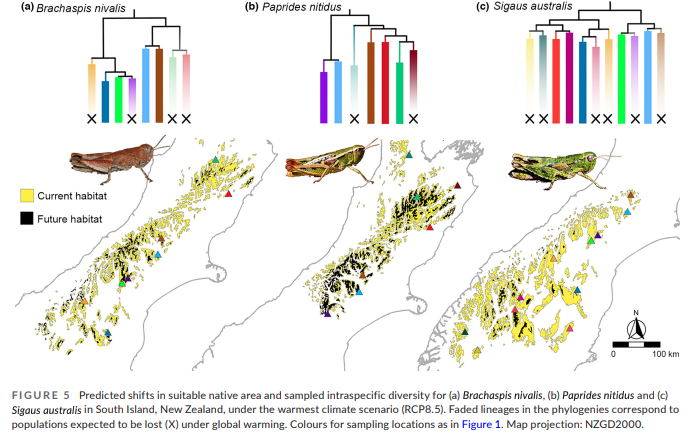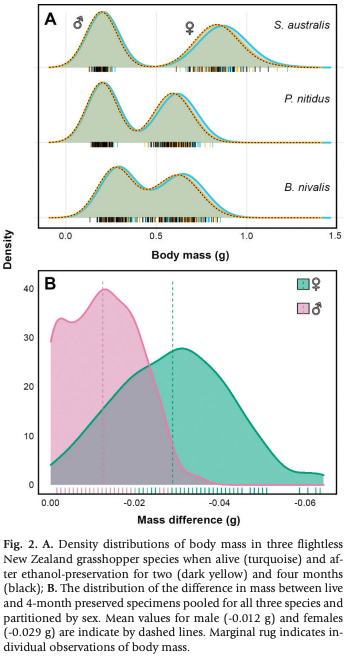|
|
| Fabio Leonardo Meza-Joya |
| |
| My research interests centre on evolutionary ecology and gaining a better understanding of the way ecosystems and their associated biota respond to change. I enjoy the application of mixed approaches, including ecological niche modelling and niche analyses, phylogeography and historical demography, and statistical modelling to explore patterns of biological diversity and ecological responses to disturbances. I completed my undergraduate (BSc, Biology, 2010) and first postgraduate studies (MSc, Biology, 2016) at Universidad Industrial de Santander (Colombia). My undergraduate research project assessed the toxic, cytotoxic, and genotoxic effect of the Roundup® SL - Cosmoflux® 411F mixture on the direct development frog Eleutherodactylus johnstonei (Eleutherodactylidae). I then shifted focus for my MSc research, which examined spatial and historical drivers of geographic variation in species diversity in Andean frogs in the genus Pristimantis. I started my PhD in Ecology at Massey University in February 2021. |
 |
PhD research
The biotic consequences of climate change have attracted considerable attention since the pace of the anthropogenic climate crisis became recognised. The alpine state of New Zealand and its endemic fauna provide a marvellous lens to examine responses of native systems to environmental shifts because they remain relatively intact but are very sensitive to increasing temperatures. Will New Zealand alpine specialists undergo adaptive evolution in response to ongoing and future global warming, or is the Earth heating too quickly for evolution to keep pace?

The first focus of my PhD work is to examine the influence of past and future climate change on New Zealand’s endemic alpine grasshoppers, as representatives of New Zealand’s alpine fauna. For this, I used an integrative approach combining phylogeographic tools, demographic statistics, phenotypic data (size and shape), niche models and niche metrics, and genotype–phenotype–environment associations. My findings indicate that (1) distinct climatic, biological, and geophysical factors controlled population structuring of grasshopper species during the Pleistocene with a legacy of spatially separate intraspecific lineages; (2) departures from current climatic conditions are projected to vary with geography, and so species exposure and vulnerability to climate change; (3) the rate of habitat loss predicted over the next 50 years of warming will lead to smaller and more-fragmented populations with reduced adaptive potential; (4) differences in niche features between diverging intraspecific lineages may lead to lineage-specific responses; (5) distinct climatic factors influence body size clines, and this might strongly influence potential phenotypic responses. An important take away is that closely related species are predicted to respond in different ways to climate change, suggesting such responses are more evolutionarily labile than conserved. |
 |
Thesis papers
Meza-Joya FL, Morgan-Richards M, Trewick SA. 2025. Forecasting range shifts in terrestrial alpine insects under global warming. Ecology & Evolution 15: e70810
Meza-Joya FL, Morgan-Richards M, Trewick SA. 2024. Phenotypic and genetic divergence in a cold‐adapted grasshopper may lead to lineage‐specific responses to rapid climate change. Diversity & Distributions :e13848
Meza-Joya FL, Morgan-Richards M, Koot EM, Trewick SA. 2023. Global warming leads to habitat loss and genetic erosion of alpine biodiversity. Journal of Biogeography 50: 961–975 https://doi.org/10.1111/jbi.14590
Meza-Joya FL, Morgan-Richards M, Trewick SA. 2022. Relationships among body size components of three flightless New Zealand grasshopper species (Orthoptera, Acrididae) and their ecological applications. Journal of Orthoptera Research 21: 91–103
Other science publications: https://www.researchgate.net/profile/Fabio-Meza-Joya
|
|
|
|